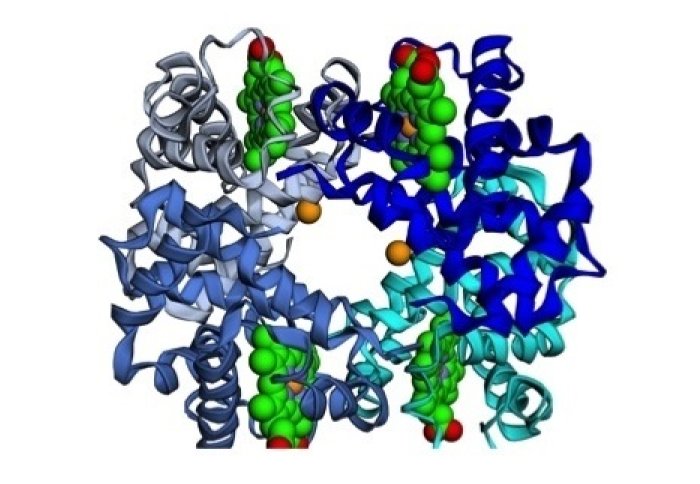School biology teaching given a helping hand with molecular game and software

A molecule rendered in EzMol
Two free interactive platforms that teachers could use to help students learn about molecular biology have been developed by researchers.
The first is a free web-based molecular imaging program (EzMol), which is linked to an A-level tutorial on the structure of proteins and nucleic acids. The second is a free mobile game (BioBlox2D) based on docking molecules, which includes an educational quiz.
We are thrilled to provide school students with a free and accessible program to interactively view the complex shape of proteins and nucleic acids, which they previously may only have seen as flat pictures in their textbooks. Professor Michael Sternberg
EzMol brings to life the complex three-dimensional shape of proteins and nucleic acids. Via the EzMol web site, students can upload the structure of a molecule, choose a view, interactively select and colour the regions of interest, and then save images to use in essays.
EzMol also has a schools portal, which links its graphics to a quiz about the structure and function of proteins and nucleic acids, aimed at A-level students. EzMol was developed in the laboratory of Professor Michael Sternberg at Imperial College London as a research tool and is already used by both university students and researchers to illustrate their molecules.
Professor Sternberg, from the Department of Life Sciences at Imperial College London, said: “We are thrilled to provide school students with a free and accessible program to interactively view the complex shape of proteins and nucleic acids, which they previously may only have seen as flat pictures in their textbooks.”
Docking molecules
BioBlox2D is a fun-to-play mobile game based on docking shapes, jointly developed by Imperial and Goldsmiths, University of London. This Tetris-like game is inspired by how biological molecules work, recognising one another in terms of both their shape and electric charge. In the game the player has to manipulate small fragments into a target, matching not only shapes but also complementary red and blue colours, which represent negative and positive charges.
As the game progresses players score points and win bioblox coins. To progress through the levels, players have to answer a biology-based quiz with questions such as:
Proteins are made of a long chain (polymer) of…
a) nucleotides
b) amino acids
c) ribosomes
BioBlox2D is free to download from the App store and Google Play.
Overview of EzMol and BioBlox2D.
Professor William Latham, from the Department of Computing at Goldsmiths, and Creative Director of the project, said: “In BioBlox2D we open the world of molecular docking to the mass market casual games player, where they have fun playing our puzzles while at the same time learning about the science.”
Frederic Fol Leymarie, Professor of Computing at Goldsmiths and co-lead on the project, added: “Each of us is made of tens of trillions of cells. Each cell, like a little regulated world, maintains itself by molecular assembly of simpler structures – such as proteins, lipids and carbohydrates – surrounded by water molecules, and each assembly is a building block of tiny biological machines. Our aim is to open up this fantastic nanoscale world to the (young and older) minds by providing instructive, dynamic software applications and digital games.”
The two new resources will be promoted at the Bett Educational Show in London 23-26 January 2019, where Imperial and Goldsmiths will be demonstrating the benefits of EzMol and BioBlox for education in schools. The researchers hope the tools will also be of interest to a far wider audience, including those studying at university and the general public.
The projects were supported by the Biotechnology and Biological Sciences Research Council (BBSRC).
Article supporters
Article text (excluding photos or graphics) © Imperial College London.
Photos and graphics subject to third party copyright used with permission or © Imperial College London.
Reporter
Hayley Dunning
Communications Division